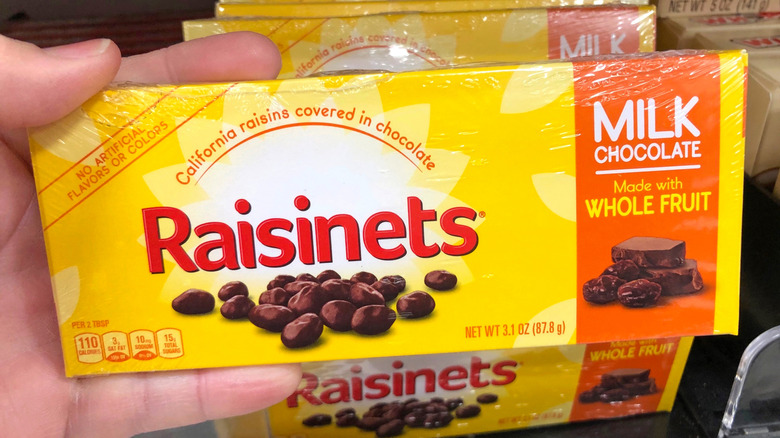The Invention Of Raisinets Dates All The Way Back To The 1920s
Raisinets are the perfect movie theater snack. For those who've never tried them, they're a plump raisin covered in chocolate. Sweet and chewy, they're specially made so they won't melt in your hand. Raisinets are a treat that's been enjoyed in America for almost 100 years.
Raisinets were invented in 1927 by The Blumenthal Brothers Chocolate Company of Philadelphia. These chocolatiers were also responsible for introducing the world to the chocolate-covered peanut snack Goobers and the crunchy, chocolatey Sno-Caps. Films were gaining popularity then, and the company took advantage of that interest by creating food perfectly portioned for snacking moviegoers. Coincidentally, the first movie with spoken dialogue ever shown in theaters, "The Jazz Singer," made its premiere the same year as Raisinets.
Because of this, Raisinets became one of the most popular snacks of the 1920s. Raisins are high in fiber and a great source of antioixidants, and while the chocolate coating may not be considered health food, they're still a good choice compared to other candies. In fact, Raisinets made our list of nine guilt-free snacks.
A classic confection
Raisinets have their place in confectionary history, literally — the National Museum of American History at the Smithsonian has a Raisinets box from 1960 in its collection. What's more, the snack has amassed such popularity that there's even an official annual holiday, National Chocolate Covered Raisin Day, celebrated every March 24th.
The Blumenthal Brothers owned their confections business until Nestle bought Raisinets (Goobers and Sno-Caps, too) in 1984. In 2018, Nestle went on to sell their entire confectionery division to Ferrero, the folks who make those decadent truffles and everyone's favorite chocolate hazelnut spread, Nutella. Like those that came before them, Ferrero knows the chocolate business.
The next time you're at the movies, pick up a box of Raisinets and take a moment to appreciate the snack's long and celebrated history. With its continued popularity, there's a good chance that Raisinets may be around for another 100 years!

